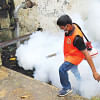Yet another dengue record

None of us had expected that dengue would claim the lives of 24 people in a single day—that, too, in winter, when infections decline. But Wednesday witnessed the highest number of deaths from the mosquito-borne disease in Bangladesh's history. Despite the authorities repeatedly pledging to take effective measures, every successive year brings with it new dengue records, proving their words hollow. We fear that if this inaction continues to reign, next year may be even worse.
On the same day, the country witnessed another unfortunate milestone—the dengue death toll crossing 1,500 this year. In just the first 15 days of this month, 172 dengue patients have died. If such a harrowing situation continue to prevail, which it seems like it will, we will achieve yet another record—the caseload crossing the 300,000-mark.
Regarding the record deaths, experts have pointed to our neglected healthcare system for being one of the culprits. While dengue usually wreaks havoc in Dhaka, this year the disease has spread to all 64 districts of the country. In absence of proper treatment facilities in rural areas, a significant number of patients are being referred to Dhaka, overburdening the capital city's healthcare facilities, resulting in more deaths. Meanwhile, the health ministry is still failing to utilise its budget. In the first 10 months of FY2022-23, the ministry spent only 32.22 percent of its total Tk 12,189.77 crore allocation. It is utterly frustrating to see that the relevant government agency has the means to thwart this crisis, yet it has failed to do so.
While dengue is common in monsoon (June-September), its prevalence is now year-round thanks to the shifts in the weather patterns caused by climate change. Against this backdrop, experts have been vehemently calling for year-round measures, but the relevant authorities have shown little initiative to take on such plans. The announcement of a public health emergency was needed weeks ago, but the government categorically refused to pay heed to this call. By far, the perfect examples of incompetence are the two Dhaka city corporations. They spent Tk 1,080 crore in the last 11 years for mosquito control, and the situation, far from improving, has taken a nosedive.
If the government is truly interested in saving lives and preventing another catastrophe next year, it must take sound initiatives proposed by the experts. Our healthcare system has to be decentralised: rural and primary healthcare centres must be properly equipped to treat dengue patients, and resources have to be allocated at the municipality level. The union councils reportedly have no vector control capacity, which has to be ensured as the disease is now prevalent across the country. If these immediate needs alongside year-round dengue control measures are guaranteed, we hopefully won't lose so many lives next year.


 For all latest news, follow The Daily Star's Google News channel.
For all latest news, follow The Daily Star's Google News channel. 











Comments